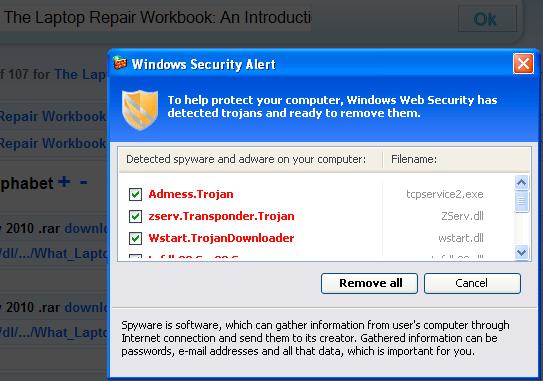Last week, I came across such a mashup on the DocStoc website after Googling a unique phrase from one of my books. DocStoc was selling the book for $10.93, which I assume means the individual who uploaded it assigned a price and will get the majority of the earnings. I filed a standard DMCA takedown request with DocStoc, and received a reply from their technical support that while the title of the file was the same as my book and they would change that title, it wasn't an infringement and they wouldn't take it down. When I wrote back pointing out that their own search function brought up the file for unique phrases from my copyrighted work, I received no answer. So the next day, I purchased the file to be able to definitively show that the eBook they were selling had ripped-off my work. I documented this in the screen capture video below, my apologies for the broken commentary, but I wasn't going to make multiple purchases for multiple takes:
Finding that the eBook for sale was a mashup of book excerpts from my website and articles from a computer support website was no surprise, but the Trojan virus downloader took me aback. I would have assumed that DocStoc would at least pre-scan the files that were uploaded so they don't spread viruses to their user base. Another surprise was finding out that PayPal wouldn't refund my purchase. I had chosen PayPal thanks to seven years of a good working relationship with them, and thought that they offered the same protection as a credit card. It turns out that they won't refund for purchases of fraudulent goods or materially misrepresented items, unless the sale takes place on eBay. I invited PayPal to comment for this post without a response, though I did just hear from DocStoc thanking me for pointing out this problem, probably a damage control intern posing as the CEO.
I've seen a number of mashups with my copyrighted content over the years, some of which seem to have been created for the sole purpose of promoting the pirated eBook. Here's an example of a pirate who added a "bonus" infringement to an eBook I originally published in 2004 with Adobe DRM.

Pirates who do mashups can be quite indignant about being identified as copyright infringers. When I commented on a pirated copy of my Laptop Repair Workbook on ScribD that it was a copyright infringement, the uploader actually responded to me saying that his friend had bought a copy of the eBook and he himself had edited it (removed my name and license agreement and added "for ScribD") and concluded, "What are you doing on ScribD anyway?" I leave out the explitives. Another over-active pirate decided that the 2004 version of my computer flowcharts eBook he ripped-off needed an update. He found those updates on my website, and bundled them with the PDF for a file mashup.
My favorite creative rip-off to date was a user on Demonoid who posted a copy of my Laptop book, complete with a link to my Youtube book promotion video, to encourage picky downloaders who aren't willing to steal just anything. The thread included 57 thank you notes posted to the generous pirate patron, including one reading: "Gr8!! I've been looking for this... Ur #1!!" I guess that makes me #2, which isn't such a good thing in either baby talk or eBook publishing.
As I wrote just last month in concluding that DMCA encourages piracy , my primary concern is honest individuals being led to piracy sites by search. Searches on an author's name today often bring up a piracy site in the top ten results, either in the text search results or the integrated image search results. I first noticed a few weeks ago that half the images coming up above the fold on standard Google search results for my name led to piracy sites. I've been using the "Report image" option to try to weed them out with some success. As of this morning, only the last image led to a piracy site.

Add "ebook" to a search on an author's name, and the majority of the results may be piracy sites. I spent about 20 hours in the past week filing DMCA takedown notices and fighting off viruses. Maybe that will help keep the lid on for another few months, but it's clear that word-of-mouth customers searching for an author's books can easily be led astray into piracy sites, without ever realizing they are doing something wrong. In some cases, they may pay a subscription fee to the piracy site in the belief that the author or publisher is getting a share, just like buying an eBook on Amazon Kindle or Apple iPad. Unfortunately, unlike Amazon and Apple, some piracy sites specialize in trying to get you to install malware under the pretense of protecting you:

Hint: Never click "Remove All" on a pop-up window. Close the screen, preferably after severing your Internet connection to avoid mistakes.
11 comments:
Thanks for giving us a heads up on piracy. I hadn't thought to do a search by name or "ebook", but I will now on a regular basis. I'll also be adding a link to this article in one of my blog posts. Important information. Thanks again!
Virginia,
If you really have the desire to put fires out before they spread, the best way is to hit "Show options" on Google search and restrict the results to the last 24 hours. If you do it every day, with your name, book titles, a unique phrase, you can often stop particular incidents from spreading too far. I don't have the stomach for it myself, makes me discouraged with my fellow man:-)
Morris
Well Morris, this seems to blow out of the water one of the tenents of the pro piracy types who say they can't afford it or the old I ain't stealin' from nobody 'cus I ain't gonna be buy a copy anyway.
In that in taking and selling on, there is active and selling on of your goods hardly any different from shoplifting I suppose.
But Morris? Scribd apparently has a function where you can upload the PDF file to them and they claim to scan files similar to yours (I do not know how I maybe a compu Sci grad but that was 12 years ago!). So does this not work as claimed?
This is a real concern for small publishers like me. That's why I have been so reluctant to offer e-books. Maybe, focus on a subscription-only service with regular updates combined with pod books might be the way forward?
Chinese Guy,
Funny on the ScribD filter, I just suggested the exact thing to DocStoc, creating a snippet library from volunteer book DNA contributions to filter out infringements.
I'll have to read up on the ScribD program. I know they can't be using previous infringements that have been removed to do it because I've seen repeats, but I think they keep an eye for exact title matches and copyright notices on works that they've been notified about.
Morris
Wilfredw,
If you're willing to live without eBook sales, you'll rarely get ripped off unless your work is very popular - popular enough for somebody to scan it. I don't see many readers ebing interested in a subscription model for books.
Morris
I wonder if Kindle-only or iPad-only ebooks (as opposed to downloadable PDFs like you sell, Morris) are less susceptible to piracy? Obviously the pirates can convert the files, but perhaps with DRM provided by Amazon and Apple it would slow it down a bit. Not sure......
Bryan
The way I see it, Morris, you have a 3-fold higher risk for ebook piracy than most:
1. Laptop repair customers are tech savvy and so know how to look for pirated ebooks.
2. The audience is tech savvy and so know how to upload and sell them.
3. People who are repairing their laptops are generally pretty shrewd and savvy financially (most people throw it away and get a new laptop) so they are hunting for the cheap fix, eg saving $10 on an ebook is a big deal when you are talking about $10 laptop parts.
Do you notice as much pirating among your other titles, or mainly the laptop book? I believe that is a key question.
Bryan
Bryan,
Kindle and iPad are a tougher nut only until somebody releases an easy-touse hack that makes them an easier nut. The second mashup example in the post with my older eBook was published with Adobe DRM through Ingram/Lighning Source. Hacked once means hacked forever.
Morris
Morris
Bryan,
Piracy isn't a technical issue. I get e-mails from mothers who fix laptops for their college age sons. The sons swim in a sea of piracy and they probably call mom to change a lightbulb as well.
There is no tech savvy required to be a pirate. You Google what you are looking for and click on links.
Shrewdness is not inversely proportional to honesty, if anything, I'd guess the other way around. People who actually think things through are more likely to respect others rights.
Piracy of my eBooks is basically proportional to sales. The ones I sell (or sold:-) the most of get pirated the most.
That said, I think there is a higher rate of piracy in computer books, not because the technical proficiency of the audience, but because a decades old tradition of information sharing. That tradition has been rapidly dying out for competitive reasons and consolidation in the industry (you don't see Google sharing search engine algos), but it's used as an excuse to steal by geeks who don't want to pay for stuff.
Morris
So I have to ask, as a budding ebook seller myself -- is it worth it? If you had it to do over again, would you still go the ebook route?
Bryan
Post a Comment